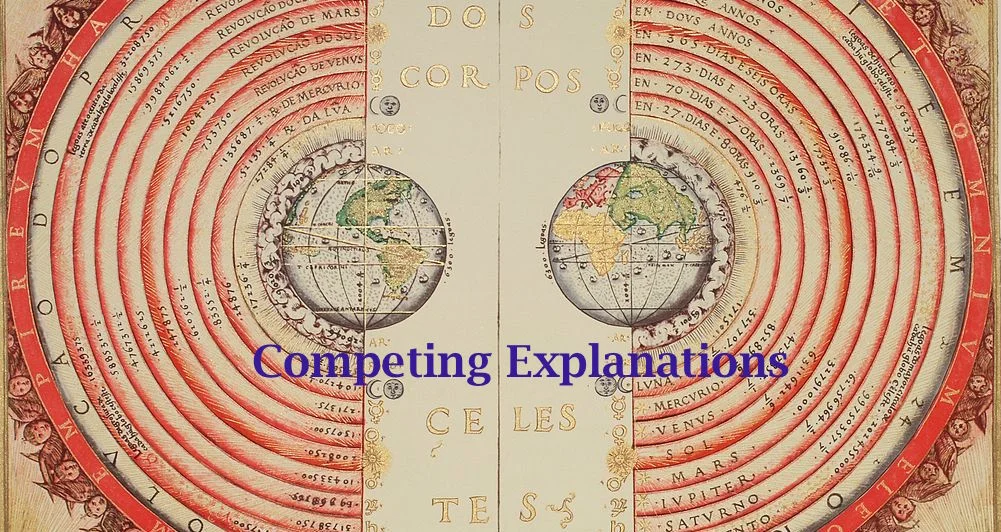Gospel & Universe 🔭 The Sum of All Space
Competing Explanations
At 23.5 Degrees - Ptolemy - Gospel & Universe - The New Almagest
🔭
🔭
Ptolemy
For thousands of years people believed that the earth didn’t move, and that the stars whirled around the earth. In the third century BC, Aristarchus suggested that the earth moved around the sun. Yet his plan was inaccurate in the particulars. It also couldn’t compete with practical observation (the still table at 4 AM), with the status of geocentric philosophers such as Plato and Aristotle, and with the desire to square astronomy with the Bible’s unmoving Earth:
the world also is stabilized [...] it cannot be moved (Psalm 93:1); the world also shall be established that it shall not be moved (Psalm 96:10); [the Lord] laid the foundations of the earth, that it should not be removed for ever (Psalm 104:5); the world also shall be stable, that it be not moved (1 Chronicles 16:30); The sun also ariseth, and the sun goeth down, and hasteth to his place where he arose (Ecclesiastes 1:5).
In his Almagest (2nd C. AD), the Greco-Egyptian mathematician and astronomer Claudius Ptolemy presented a formal system in which the earth stood still in the middle of a cosmos that circled it. In its geometrical arguments Ptolemy’s Almagest is extremely valuable. Yet unfortunately the Church took Ptolemy’s model as gospel, as if this were the only way to see the universe.
Above is a 1568 drawing of the Ptolemaic universe by Bartolomeu Velho. Note the Primo Mobile (the First Moved part of the universe) and the Empireum (Heaven) in the widest circumference, as well as the figures of Christ and God (the Unmoved Mover) on the top corners.
Ptolemy’s geocentric view of the universe fused with religious cosmology and mythology, including places such as Heaven and Hell, and figures such as God and the Devil. Borrowing from Jewish and other traditions, Christians constructed a geocentric view of the universe that included
1) the Jewish certainty that their God was the only true God, that is, the only true ruler of the universe,
2) the Christian certainty that only through Jesus could one find the highest truth, and
3) the Christian certainty that the Hebrews were unable to see the higher truth of Jesus, and that the Christians were (in fact, if not in name) God’s new Chosen People.
🔭
🔭
The New Almagest
Around the beginning of the Modern Age (around 1500 AD) the geocentric view of the universe became increasingly difficult to maintain. Copernicus, Brahe, Kepler, and Galileo could see the cosmos more clearly as a result of their better telescopes. The illustration below, from the frontispiece of Giovanni Riccioli’s New Almagest (1651), dramatizes the debate between what Galileo referred to in 1632 as the two chief world systems. In the illustration we see Astraea (companion to the Greek goddess of justice), weighing the merits of the geocentric versus the heliocentric system. Above her (and above the debate) is the almighty finger of God.
God’s position in the drawing suggests that whether or not we’re at the centre of the universe, God still started and controls the cosmos. The problem, however, is that Astraea, with God watching, finds the geocentric model to have more weight. Either God is all-knowing and He got it wrong, or those who are speaking on behalf of the Deity should only speak for themselves.
In recent centuries we’ve expanded our awareness of how small we are, here in our little solar system. One of the best examples of this is the 2013 discovery of the sheet of galaxies referred to as the Hercules-Corona Borealis Great Wall. This Great Wall is 10 billion light-years away, and an almost incomprehensible ten billion light-years wide.
For many people these discoveries expand our notion of the infinity of God: the larger the universe is, the more staggering the Power that holds it together and gives it all meaning. Yet with this notion comes a corollary: the more distant and diverse are the realms in which God operates, the more any particular human or historically-grounded definition of God becomes reductive, paradoxical, and difficult to maintain.
🔭
Next: 🔭 Cities of God





